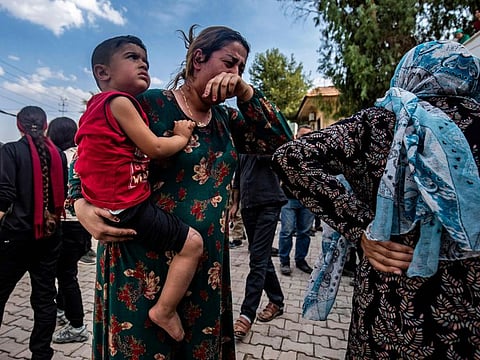Turkey’s aggression rattles Middle East region
It is time for countries in Mena to realise only they can solve issues between themselves

Last week the United States, under the directives of President Donald Trump, began pulling out its troops from northeastern Syria where they had been stationed — alongside their allies the Kurdish militia, also known as the People’s Protection Units or YPG — to help fight Daesh.
The Kurdish forces were an invaluable partner along with the US in the mission to defeat the Daesh group. Trump’s reasoning was very clear in his tweet: “We have defeated [Daesh] in Syria, my only reason for being there during the Trump Presidency.”
While Trump’s move caught the international community by surprise, almost immediately, it cleared the way for a Turkish military offensive that has inflicted great civilian harm.
Turkey claims that its operation is confined to removing the YPG from its southern border with Syria.
Since the beginning of the Syrian conflict and the rise of Daesh, Turkey has viewed the YPG as terrorists with close ties to the separatist Kurdish group in Turkey, the PKK, who have been waging a decades-long violent insurgency for their own statehood.
With Trump’s decision, Turkey needed no further encouragement and began its military mission to eliminate what it perceives to be a potential threat to its borders.
In a region rattled by conflict in the past two decades, this latest conflict has added international concern.
The UN secretary-general called for an immediate de-escalation stating that more than 160,000 civilians had fled their homes because of the Turkish offensive.
The 28-member EU foreign ministers’ bloc meeting in Luxembourg condemned “Turkey’s military action which seriously undermines the stability and the security of the whole region.”
Also Read: Saudi Arabia must keep racing to the future
Also Read: Donald Trump must weigh his words carefully
Also Read: Why cleanliness is important to us
In Saudi Arabia, the government reiterated its condemnation of Turkey’s military operation in northeastern Syria.
The cabinet stressed that “Ankara’s incursion threatens regional security and peace”, alluding to the recent Arab League foreign minister’s emergency meeting that called upon the United Nations Security Council to take the necessary measures to end Turkey’s aggression.
Calling the attack “a flagrant violation of the UN Charter and Security Council resolutions that call for preserving the territorial integrity of Syria”, the cabinet stated that the only way to resolve the conflict in a way that achieves the security of Syria and neighbouring countries was through political rather than military means.
Other Saudi government figures were also not amused. The former chief of Saudi Arabia’s intelligence services and a former ambassador to the US Prince Turki Al Faisal said: “The situation in Syria, we really don’t know where the United States is, for example, is it in or is it out? For US forces to all of a sudden, fold up their tents and silently fade away is, I think, not the right thing to do.”
The Saudi ambassador to the UK, Prince Khalid Bin Bandar, bluntly stated, “We don’t like it. I’ll be a little bit more undiplomatic in that I think it’s a disaster for the region…The last thing we need is another front of chaos in the region and I think we just got it. How we solve that I don’t know.” Commenting on whether the Trump administration is a trustworthy ally, he added, “We are concerned, no question. What has happened in Syria with Turkey and pulling out the troops, it doesn’t give one incredible confidence.”
Turkey is now adding to the morass of more misery in the regionTariq A. Al Maeena
So now we know.
Trump is doing what he feels is good for America and the rest of the world be damned! He has already boasted of the fact that the US does not need any country’s oil as domestic production matches the country’s needs.
He is following a campaign promise to bring the troops home.
Stating his aversion to the US involvement in the war on Iraq, Trump wants the regional players to fight their own squabbles and pay dearly for the arms, which he is only too eager to sell.
Some would say that such a direction is good for America. A move towards isolation and building their own economy. Others argue that the absence of US involvement in the region would lead to further chaos.
Whatever the outcome, perhaps it is time for the regional countries to recognise that no one is going to solve issues between them except themselves. And that political dialogue is perhaps the safest way to reduce tension in the region.
Almost two million refugees resulted following the US occupation of Iraq from 2003 to 2011. The Syrian conflict has added another 13.5 million displaced persons to the fray. Not included are the hundreds of thousands of casualties of meaningless conflicts that could have perhaps been averted with increased dialog and maturity. Turkey is now adding to the morass of more misery in the region.



